|
|
|
Sort Order |
|
|
|
Items / Page
|
|
|
|
|
|
|
| Srl | Item |
| 1 |
ID:
130648


|
|
|
|
|
| Publication |
2013.
|
| Summary/Abstract |
The committee's report has highlighted the diversity of the countries of the Indian Ocean Rim and the multiple ways it which these states can be categorised. This diversity and the lack of a single agreed definition of the 'Indian Ocean Rim' has created a significant challenge for the development of policy, from both an Australian and a regional perspective. Australia's approach to trade in the Indian Ocean Rim is largely bilateral; defence and strategic relations are based on single issue groupings; and aid to the region is predominately provided under the auspices of the United Nations. Evidence gathered in relation to the Indian Ocean Rim Association for Regional Co-operation (IOR-ARC) demonstrates clearly that diversity in the region - both economic and political - has created inertia in the region's main organisation.
|
|
|
|
|
|
|
|
|
|
|
|
|
|
|
|
| 2 |
ID:
130644


|
|
|
|
|
| Publication |
2013.
|
| Summary/Abstract |
With the 'global land grab' now a primary ongoing process in the developing world, greater attention to region-specific analyses provides critical insights for effective policy responses. The Indian Ocean world has the greatest regional concentration of large-scale land acquisitions (LSLAs) globally, and it is also where most of the investor countries reside. Yet examination of Indian Ocean-specific patterns and processes of LSLAs is lacking. One of the most sought after categories of lands are those in forested or recently forested areas, owing to their high potential natural resource and agricultural value. This review article examines the primary issues, actors and impacts of LSLAs of forest-related lands in the broader Indian Ocean world, while assessing the opportunities for national populations of target countries as well as investors and the key social and environmental concerns requiring policy attention.
|
|
|
|
|
|
|
|
|
|
|
|
|
|
|
|
| 3 |
ID:
125894


|
|
|
|
|
| Publication |
2013.
|
| Summary/Abstract |
With the 'global land grab' now a primary ongoing process in the developing world, greater attention to region-specific analyses provides critical insights for effective policy responses. The Indian Ocean world has the greatest regional concentration of large-scale land acquisitions (LSLAs) globally, and it is also where most of the investor countries reside. Yet examination of Indian Ocean-specific patterns and processes of LSLAs is lacking. One of the most sought after categories of lands are those in forested or recently forested areas, owing to their high potential natural resource and agricultural value. This review article examines the primary issues, actors and impacts of LSLAs of forest-related lands in the broader Indian Ocean world, while assessing the opportunities for national populations of target countries as well as investors and the key social and environmental concerns requiring policy attention.
|
|
|
|
|
|
|
|
|
|
|
|
|
|
|
|
| 4 |
ID:
125893


|
|
|
|
|
| Publication |
2013.
|
| Summary/Abstract |
A rising Africa has caught the attention of the world not merely because of its vast natural resources but also because it is the economically fastest growing continent. The article argues that, as Africa gains prominence, the roles of China and India have come into focus. New Delhi's current policy is quite different from that it pursued in the post-independence era, which was focussed on the limited political agenda of anti-colonialism. Even as its interests in the Indian Ocean rapidly grow, its great power ambitions are increasing backed by a burgeoning economy. This has necessitated a new a new policy of engagement that is expansive and multifaceted, encompassing political, economic and strategic dimensions. India maintains that its robust economic relationship is part of South-South cooperation and hence mutually beneficial, for it is aimed at capability and institution building. While economic and political aspects continue to dominate the academic discourse, the Indian Ocean is beginning to become a significant factor in India's Africa policy, even as this ocean acquires enormous geostrategic and economic importance.
|
|
|
|
|
|
|
|
|
|
|
|
|
|
|
|
| 5 |
ID:
130643


|
|
|
|
|
| Publication |
2013.
|
| Summary/Abstract |
A rising Africa has caught the attention of the world not merely because of its vast natural resources but also because it is the economically fastest growing continent. The article argues that, as Africa gains prominence, the roles of China and India have come into focus. New Delhi's current policy is quite different from that it pursued in the post-independence era, which was focussed on the limited political agenda of anti-colonialism. Even as its interests in the Indian Ocean rapidly grow, its great power ambitions are increasing backed by a burgeoning economy. This has necessitated a new a new policy of engagement that is expansive and multifaceted, encompassing political, economic and strategic dimensions. India maintains that its robust economic relationship is part of South-South cooperation and hence mutually beneficial, for it is aimed at capability and institution building. While economic and political aspects continue to dominate the academic discourse, the Indian Ocean is beginning to become a significant factor in India's Africa policy, even as this ocean acquires enormous geostrategic and economic
|
|
|
|
|
|
|
|
|
|
|
|
|
|
|
|
| 6 |
ID:
125891


|
|
|
|
|
| Publication |
2013.
|
| Summary/Abstract |
The African littoral of the Indian Ocean is a significant part of the Indian Ocean region. In the context of the IOR-ARC, focus is given to the African littoral of the Indian Ocean Rim, which consists of 10 states plus three French island territories. However, an African Indian Ocean extended area of 24 states plus the French islands can be identified as part of the broader Indian Ocean region, to which we refer as the African Indian Ocean littoral and hinterland. This highlights the fact that the African land-locked states represent a pertinent and significant dimension to the relation between the African littoral and the rest of the Indian Ocean region. Overall, this African Indian Ocean littoral and hinterland is a region of low socio-economic development facing many challenges. Nonetheless, it is a region on the move, and some substantial improvements can be expected during the entire twenty-first century. The potential, and perhaps even expected outcome of a much larger and healthier population, a better performing and more open economy, and an increase in and more efficient management of maritime activities will set the scene for the rising significance of the African littoral to both the Indian Ocean region and the Indian Ocean Rim, thus also increasing its geopolitical and geostrategic significance.
|
|
|
|
|
|
|
|
|
|
|
|
|
|
|
|
| 7 |
ID:
130641
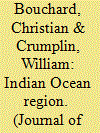

|
|
|
|
|
| Publication |
2013.
|
| Summary/Abstract |
The African littoral of the Indian Ocean is a significant part of the Indian Ocean region. In the context of the IOR-ARC, focus is given to the African littoral of the Indian Ocean Rim, which consists of 10 states plus three French island territories. However, an African Indian Ocean extended area of 24 states plus the French islands can be identified as part of the broader Indian Ocean region, to which we refer as the African Indian Ocean littoral and hinterland. This highlights the fact that the African land-locked states represent a pertinent and significant dimension to the relation between the African littoral and the rest of the Indian Ocean region. Overall, this African Indian Ocean littoral and hinterland is a region of low socio-economic development facing many challenges. Nonetheless, it is a region on the move, and some substantial improvements can be expected during the entire twenty-first century. The potential, and perhaps even expected outcome of a much larger and healthier population, a better performing and more open economy, and an increase in and more efficient management of maritime activities will set the scene for the rising significance of the African littoral to both the Indian Ocean region and the Indian Ocean Rim, thus also increasing its geopolitical and geostrategic significance.
|
|
|
|
|
|
|
|
|
|
|
|
|
|
|
|
| 8 |
ID:
125890


|
|
|
|
|
| Publication |
2013.
|
| Summary/Abstract |
This paper investigates the notion that China's proposed development of ports and supporting hinterland infrastructure on the East coast of Africa serves greater geostrategic interests within Africa and the Indian Ocean. It cautions against a trend which accuses Chinese commercial infrastructural and resource development of being symmetrical with an almost colonial-like political influence. Through a comparison with nineteenth-century German and British colonialism in the region, the paper argues that, while there are certain affinities, the Chinese presence today is significantly different. Central to the argument is that Chinese port and hinterland developments are supplemented by a host of other actors, including host states, multinational corporations and regional development funds. The broader market economic system in which China and Africa engage today entails that Chinese unfettered access to projects is complicated by the interests of multiple stakeholders. The Chinese presence has been exaggerated at the expense of other actors and thus, in any future conflict, it cannot be assumed that China will be able to mobilise this infrastructure in its interests. This has implications for the broader analysis of China's growing presence in the Indian Ocean.
|
|
|
|
|
|
|
|
|
|
|
|
|
|
|
|
| 9 |
ID:
130639
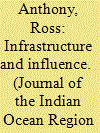

|
|
|
|
|
| Publication |
2013.
|
| Summary/Abstract |
This paper investigates the notion that China's proposed development of ports and supporting hinterland infrastructure on the East coast of Africa serves greater geostrategic interests within Africa and the Indian Ocean. It cautions against a trend which accuses Chinese commercial infrastructural and resource development of being symmetrical with an almost colonial-like political influence. Through a comparison with nineteenth-century German and British colonialism in the region, the paper argues that, while there are certain affinities, the Chinese presence today is significantly different. Central to the argument is that Chinese port and hinterland developments are supplemented by a host of other actors, including host states, multinational corporations and regional development funds. The broader market economic system in which China and Africa engage today entails that Chinese unfettered access to projects is complicated by the interests of multiple stakeholders. The Chinese presence has been exaggerated at the expense of other actors and thus, in any future conflict, it cannot be assumed that China will be able to mobilise this infrastructure in its interests. This has implications for the broader analysis of China's growing presence in the Indian Ocean.
|
|
|
|
|
|
|
|
|
|
|
|
|
|
|
|
| 10 |
ID:
130645
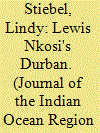

|
|
|
|
|
| Publication |
2013.
|
| Summary/Abstract |
Lewis Nkosi, the late exiled South African writer, and the city of Durban, an extended urban space of an estimated 3 million inhabitants, are incontrovertibly linked. This sprawling Indian Ocean town is where Nkosi was born, where he was educated as a small child, where he started his working career, and where he was finally buried on 10 September 2010. Given the centrality of Durban to Nkosi's life story, it is unsurprising that this city periodically appears in Nkosi's writing, both fictional and non-fictional, as a geographical 'setting' but also as a symbol of political change in South Africa. This paper, then, begins an evaluation of the role of 'Durban' and the Indian Ocean in the life and work of Nkosi, drawing from his novel Mating birds, and also from a little known article published in a Swiss newspaper, translated into German. Durban emerges from these various sources as a city in flux, a place of startling contrasts, a melting pot of peoples and a dream space called 'home' for this celebrated writer.
|
|
|
|
|
|
|
|
|
|
|
|
|
|
|
|
| 11 |
ID:
125895
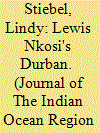

|
|
|
|
|
| Publication |
2013.
|
| Summary/Abstract |
Lewis Nkosi, the late exiled South African writer, and the city of Durban, an extended urban space of an estimated 3 million inhabitants, are incontrovertibly linked. This sprawling Indian Ocean town is where Nkosi was born, where he was educated as a small child, where he started his working career, and where he was finally buried on 10 September 2010. Given the centrality of Durban to Nkosi's life story, it is unsurprising that this city periodically appears in Nkosi's writing, both fictional and non-fictional, as a geographical 'setting' but also as a symbol of political change in South Africa. This paper, then, begins an evaluation of the role of 'Durban' and the Indian Ocean in the life and work of Nkosi, drawing from his novel Mating birds, and also from a little known article published in a Swiss newspaper, translated into German. Durban emerges from these various sources as a city in flux, a place of startling contrasts, a melting pot of peoples and a dream space called 'home' for this celebrated writer.
|
|
|
|
|
|
|
|
|
|
|
|
|
|
|
|
| 12 |
ID:
130642
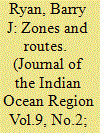

|
|
|
|
|
| Publication |
2013.
|
| Summary/Abstract |
This paper examines power relations along the African coast of the Indian Ocean in terms of space and time. Spatial strategies, it argues, are swiftly emerging through zoning mechanisms which territorialise the governance of ocean space. These strategies can supplement and disrupt more traditional temporal strategies, which facilitate speed and freedom of movement for commercial and military traffic. The article focusses on the US proposition to provide maritime security sector reform to African coastal states as a form of temporal strategy designed to shape new zoning practices in favour of freedom of movement. The paper concludes by arguing that the US strategy implies a policing approach that generates maritime surveillance capacities along land-sea lanes of communication. It contrasts this surface form of knowledge with the need for African coastal states to generate the sort of oceanographic data presently undergirding the emerging blue economies of Europe.
|
|
|
|
|
|
|
|
|
|
|
|
|
|
|
|
| 13 |
ID:
125892
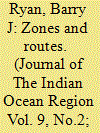

|
|
|
|
|
| Publication |
2013.
|
| Summary/Abstract |
This paper examines power relations along the African coast of the Indian Ocean in terms of space and time. Spatial strategies, it argues, are swiftly emerging through zoning mechanisms which territorialise the governance of ocean space. These strategies can supplement and disrupt more traditional temporal strategies, which facilitate speed and freedom of movement for commercial and military traffic. The article focusses on the US proposition to provide maritime security sector reform to African coastal states as a form of temporal strategy designed to shape new zoning practices in favour of freedom of movement. The paper concludes by arguing that the US strategy implies a policing approach that generates maritime surveillance capacities along land-sea lanes of communication. It contrasts this surface form of knowledge with the need for African coastal states to generate the sort of oceanographic data presently undergirding the emerging blue economies of Europe.
|
|
|
|
|
|
|
|
|
|
|
|
|
|
|
|
|
|
|
|
|